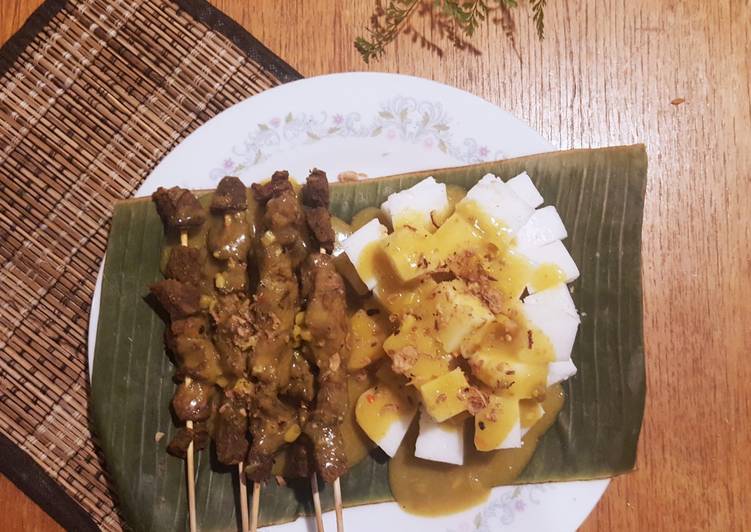
Hello everybody, it’s Brad, welcome to my recipe page. Today, I’m gonna show you how to prepare a distinctive dish, sate padang (beef satay from padang, indonesia). It is one of my favorites. For mine, I will make it a bit unique. This is gonna smell and look delicious.
Great recipe for Sate Padang (Beef Satay from Padang, Indonesia). I remember back when I still living in Indonesia, my family like to buy this skewers style satay near the mini market near our home. Originally from Padang, the same region where rendang came from, this kind. Sate Padang is a variety of sate (satay) which originates from Padang, West Sumatra.
Sate Padang (Beef Satay from Padang, Indonesia) is one of the most well liked of current trending foods on earth. It is simple, it’s quick, it tastes yummy. It’s enjoyed by millions daily. They are fine and they look wonderful. Sate Padang (Beef Satay from Padang, Indonesia) is something that I have loved my whole life.
To get started with this recipe, we must first prepare a few components. You can have sate padang (beef satay from padang, indonesia) using 18 ingredients and 9 steps. Here is how you cook that.
The ingredients needed to make Sate Padang (Beef Satay from Padang, Indonesia):
- Get 500 gr beef, diced
- Get 1 pcs lemongrass
- Prepare 2 cm ginger, crushed
- Make ready 2 cm galangal
- Take 4 pcs kaffir lime leaves (try to use the fresh one, but if you can't you can use the bottled one more less around 1 - 2 tbs)
- Take 5 pcs bay leaves (try to use the fresh one, but if you can't find any, use the dried one also fine)
- Get 50 gr rice flour
- Prepare 500 ml water
- Prepare 4 pcs birdeye chillies (less or none if you don't like spicy food)
- Get 5 pcs shallots
- Take 5 pcs garlic
- Take 2 tbs ground corriander
- Make ready 1 tbs ground cumin
- Make ready 5 cm turmeric
- Make ready 1 tsp salt
- Take 1/2 tsp white pepper
- Get 1/2 tsp sugar
- Make ready 1 cup cooking oil
Again, based on the cities/towns' name in West Sumatra. With curry based sauce and similarity to the famous of Minang-style rendang spices, this sate (satay) is quite unique compare to other satés in Indonesia. We hope you got benefit from reading it, now let's go back to sate padang (beef satay from padang, indonesia) recipe. Here is how you cook that.
Instructions to make Sate Padang (Beef Satay from Padang, Indonesia):
- Make a puree from shallots, garlic, ground cumin and ground coriander
- Mix the spice puree and the diced beef, marinate for minimum 30 minutes, overnight is better
- In the cooking pan, heat the cooking oil, then add the marinated beef, bay leaves, kaffir lime leaves, crushed ginger, and crushed galangal
- Add 250 ml water, and let it boil
- Take all the beef, save aside, throw away the leaves, ginger, and galangal
- Mix the rice flour with the other 250ml water, then add to the soup, mix until thick, simmer it with a small fire.
- Put the beef at the skewers, do it with all the beef, then apply the cooking oil (I use vegetable oil) to the beef
- If you use the grill, grilled the beef until become brown. If you use oven, bake it at 150° Celcius for 20 minutes, don't forget to flip the skewers in the middle of baking, to get all brown beef
- Serve it with rice cake, and pour the soup at the top of the skewers
We hope you got benefit from reading it, now let's go back to sate padang (beef satay from padang, indonesia) recipe. Here is how you cook that. Sate Padang is a variety of sate (satay) which originates from Padang, West Sumatra. It is traditionally made with beef, and it consists of pieces of meat or offal that are marinated, skewered, and then grilled. The skewers are typically served doused in a thick, brown-colored sauce that combines.
So that’s going to wrap it up for this special food sate padang (beef satay from padang, indonesia) recipe. Thank you very much for your time. I’m sure that you can make this at home. There’s gonna be more interesting food at home recipes coming up. Remember to save this page on your browser, and share it to your loved ones, colleague and friends. Thanks again for reading. Go on get cooking!

